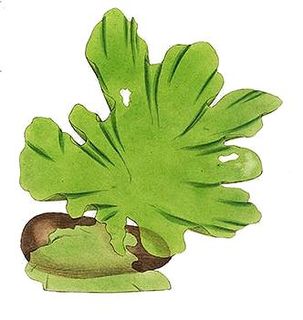
Ulvaria obscura is an intertidal and subtidal benthic marine algae found in temperate and Arctic ocean waters around the world.
Arenibacter certesii is a heterotrophic and aerobic bacterium from the genus of Arenibacter which has been isolated from the green alga Ulva fenestrata from the Sea of Japan.
Arenibacter hampyeongensis is a Gram-negative, strictly aerobic bacterium from the genus Arenibacter which has been isolated from tidal flat from Hampyeong in Korea.
Arenibacter nanhaiticus is a Gram-negative, rod-shaped and aerobic bacterium from the genus Arenibacter which has been isolated from sandy sediments from the South China Sea.
Arenibacter troitsensis is a heterotrophic, aerobic and non-motile bacterium from the genus Arenibacter which has been isolated from marine bottom sediments from the Gulf of Peter the Great in the Sea of Japan.
Roseivirga is a strictly aerobic genus from the phylum Bacteroidota.
Roseivirga ehrenbergii is a Gram-negative, heterotrophic, strictly aerobic and non-motile bacterium from the genus of Roseivirga which has been isolated from the green alga Ulva fenestrata from the Sea of Japan.
Polaribacter is a genus in the family Flavobacteriaceae. They are gram-negative, aerobic bacteria that can be heterotrophic, psychrophilic or mesophilic. Most species are non-motile and species range from ovoid to rod-shaped. Polaribacter forms yellow- to orange-pigmented colonies. They have been mostly adapted to cool marine ecosystems, and their optimal growth range is at a temperature between 10 and 32 °C and at a pH of 7.0 to 8.0. They are oxidase and catalase-positive and are able to grow using carbohydrates, amino acids, and organic acids.
Ornithinimicrobium algicola is a Gram-positive and non-spore-forming bacterium species from the genus Ornithinimicrobium which has been isolated from the green Ulva.
Amylibacter is a genus of bacteria from the family of Rhodobacteraceae.
Amylibacter ulvae is a Gram-negative, strictly aerobic, rod-shaped and non-motile bacterium from the genus of Amylibacter which has been isolated from the alga Ulva fenestrata.
Epibacterium ulvae is a Gram-negative, rod-shaped and motile bacterium from the genus of Epibacterium. It has been isolated from the alga Ulva australis from Clovelly in Australia.
Arenibacter catalasegens is a Gram-negative, aerobic, rod-shaped and non-motile bacterium from the genus of Arenibacter which has been isolated from surface sediments from the Southern Indian Ocean.
Kordia ulvae is a Gram-negative, aerobic and rod-shaped bacterium from the genus of Kordia which has been isolated from the alga Ulva.
Ulvibacter litoralis is a Gram-negative, aerobic, heterotrophic and non-motile bacterium from the genus of Ulvibacter which has been isolated from the alga Ulva fenestrata.
Winogradskyella ulvae is a Gram-negative, facultatively anaerobic, slightly halophilic and motile bacterium from the genus of Winogradskyella which has been isolated from the alga Ulva fenestrata.
Olleya algicola is a Gram-negative, strictly aerobic, rod-shaped and motile bacterium from the genus of Olleya which has been isolated from the alga Ulva fenestrata from the Pacific.
Pseudozobellia is a Gram-negative and aerobic genus of bacteria from the family of Flavobacteriaceae with one known species. Pseudozobellia thermophila has been isolated from the alga Ulva fenestrata.
Ulvibacterium is a Gram-negative, aerobic, rod-shaped and non-motile genus of bacteria from the family of Flavobacteriaceae with one known species. Ulvibacterium marinum has been isolated from the alga Ulva prolifera.
Algibacter lectus is a Gram-negative, facultatively anaerobic, heterotrophic and motile bacterium from the genus of Algibacter which has been isolated from the algae Acrosiphonia sonderi and Ulva fenestrata.
